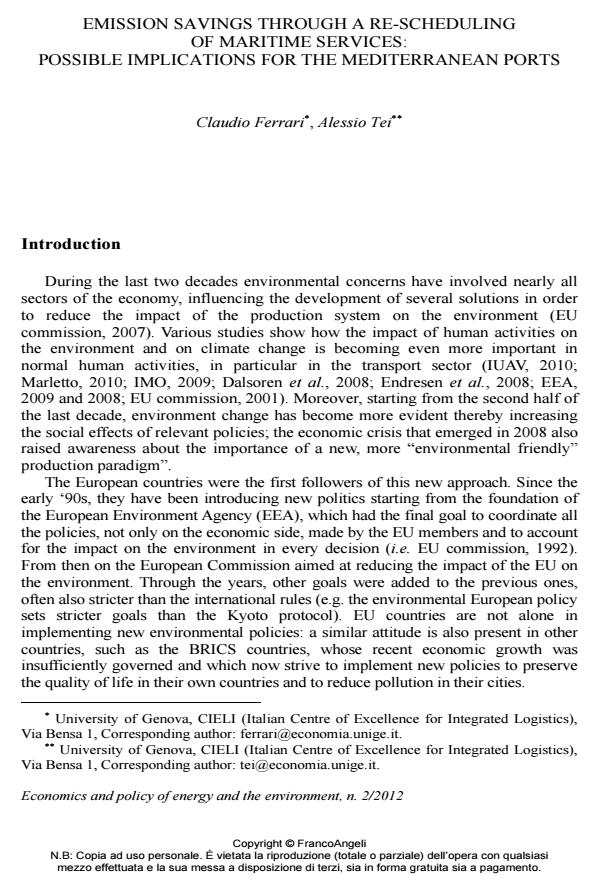Risparmi nelle emissioni attraverso una riprogrammazione dei servizi marittimi: possibili implicazioni per i porti mediterranei
Journal title ECONOMICS AND POLICY OF ENERGY AND THE ENVIRONMENT
Author/s Claudio Ferrari, Alessio Tei
Publishing Year 2012 Issue 2012/2
Language English Pages 18 P. 113-130 File size 1013 KB
DOI 10.3280/EFE2012-002006
DOI is like a bar code for intellectual property: to have more infomation
click here
Below, you can see the article first page
If you want to buy this article in PDF format, you can do it, following the instructions to buy download credits

FrancoAngeli is member of Publishers International Linking Association, Inc (PILA), a not-for-profit association which run the CrossRef service enabling links to and from online scholarly content.
The major aim of the paper is to analyse how growing awareness of environmental impact determined by trade activities can influence maritime transport and how it can facilitate changes in the current structure of maritime routes. In particular, the study compares the emissions concerning two alternatives in current maritime routes to highlight how possible incentives for emission reduction applied to maritime transport could impact the route choice. The analysis focuses on the trade routes from the Far East and South America towards Europe and it compares the emissions in two alternative scenarios: direct services calling at a North European port and shipping services calling at a Mediterranean port. In the latter scenario a significant role could be played by the North-African ports, whose development represents possible transhipment calls for the international shipping trades, mainly on the Europe-Far East route. In this sense they may act as competitors of the North European ports: their favourable geographic position allows for a considerable reduction in nautical distances with an immediate impact on the maritime transport emissions. To analyse the differences of emission impacts, this paper uses some particular statistical tools based on scientific literature and some instruments related to previous analysis in similar fields. The data used in the paper have been collected directly from shipping operators, terminal operators and some specialist databases. The paper is structured in 5 sections. After a brief introduction about transport and the environment (Section 1), Section 2 provides a review of some general methods to calculate the environmental cost of maritime transport, while Section 3 analyses the current trade route system and which ports can have an influence on changing the maritime patterns. Section 4 is focused on the analysis and comparison of the maritime routes alternatives, while Section 5 draws some conclusions and remarks for further analysis.
Keywords: Maritime transport, Emissions savings, Mediterranean ports, Transhipment
Jel codes: R41, Q56
- Intermodal nodes and external costs: Re-thinking the current network organization Daniela Ambrosino, Claudio Ferrari, Anna Sciomachen, Alessio Tei, in Research in Transportation Business & Management /2016 pp.106
DOI: 10.1016/j.rtbm.2016.05.001 - Determinants of slow steaming and implications on service patterns Claudio Ferrari, Francesco Parola, Alessio Tei, in Maritime Policy & Management /2015 pp.636
DOI: 10.1080/03088839.2015.1078011
Claudio Ferrari, Alessio Tei, Emission savings through a re-scheduling of maritime services: possible implications for the Mediterranean ports in "ECONOMICS AND POLICY OF ENERGY AND THE ENVIRONMENT" 2/2012, pp 113-130, DOI: 10.3280/EFE2012-002006